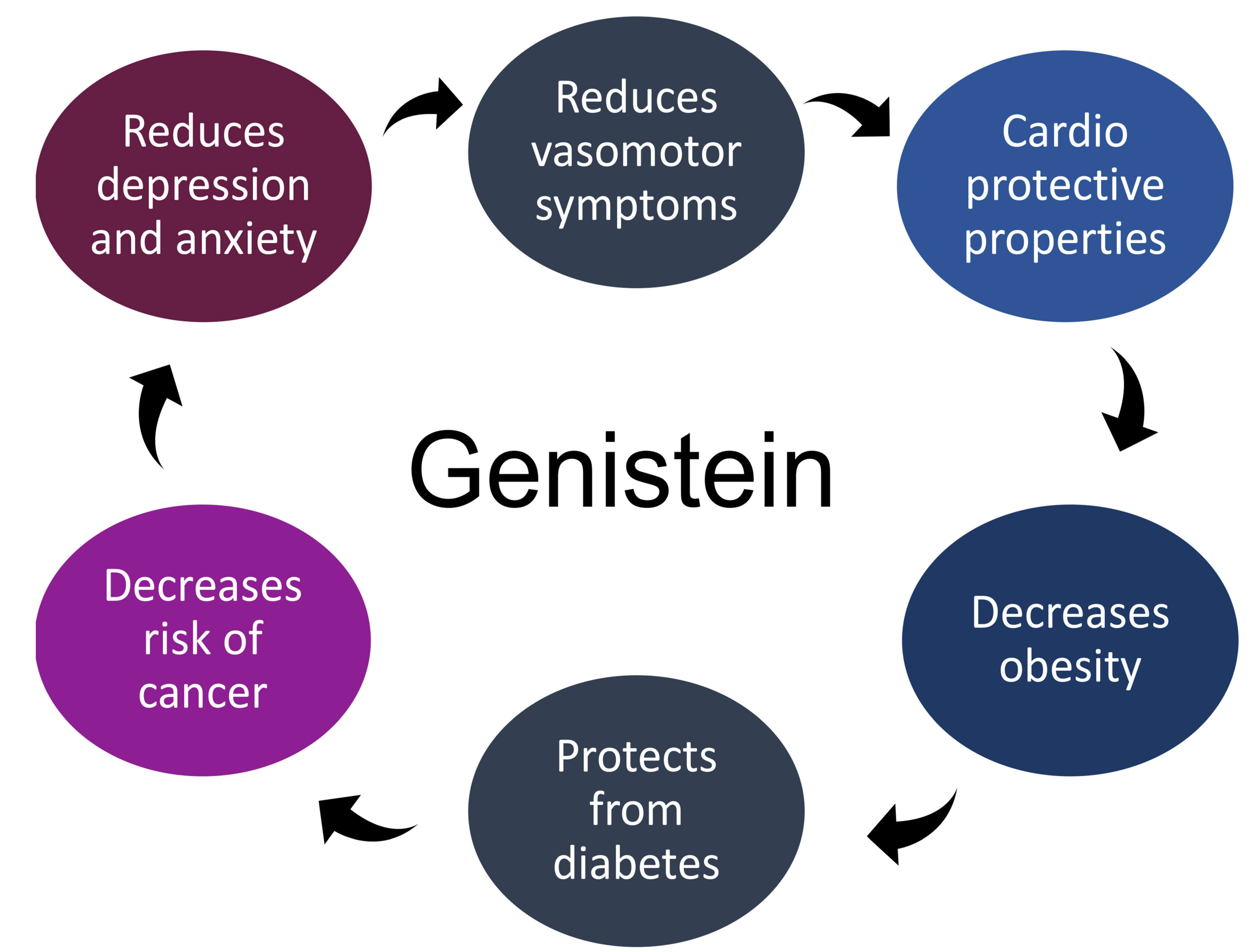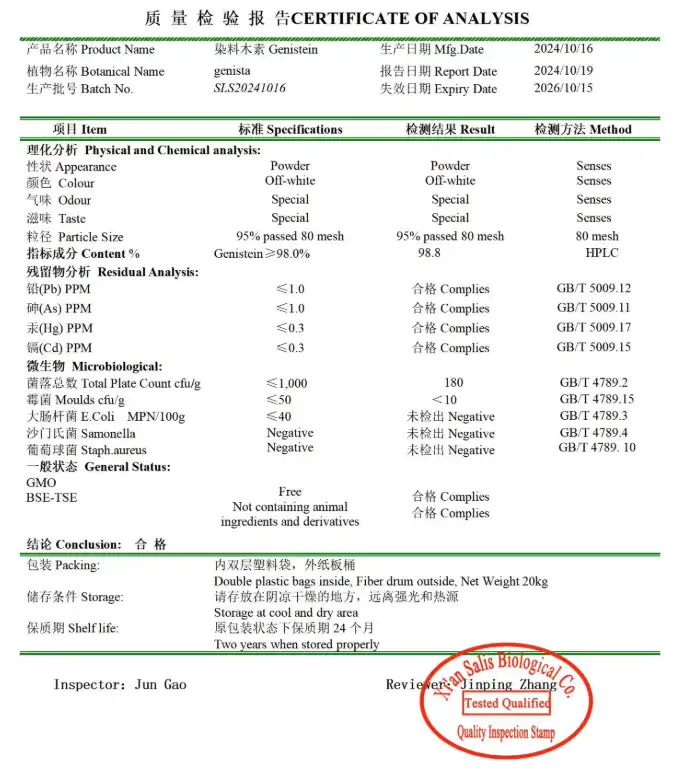Genistein powder is a powerful isoflavone compound derived primarily from soybeans and other legumes. As a phytoestrogen, it has gained significant attention in the scientific community for its potential health benefits and its ability to interact with various biological processes in the human body. Genistein works by mimicking the effects of estrogen, binding to estrogen receptors, and influencing cellular functions. This unique property allows genistein to exert a wide range of effects on different systems within the body, from bone health to cardiovascular function and even cancer prevention.

What are the potential benefits of Genistein for menopausal symptoms?
Genistein Powder has shown promising results in alleviating menopausal symptoms, particularly those related to estrogen deficiency. As women enter menopause, their estrogen levels decline, leading to various uncomfortable symptoms such as hot flashes, night sweats, and mood swings. Genistein's ability to act as a phytoestrogen makes it a potential natural alternative for managing these symptoms.
Research has demonstrated that genistein can help reduce the frequency and severity of hot flashes in menopausal women. A study published in the journal Menopause found that women who consumed genistein supplements experienced a significant reduction in hot flash frequency compared to those who took a placebo. The mechanism behind this effect is thought to be related to genistein's ability to modulate the thermoregulatory center in the brain, which is responsible for controlling body temperature.
Moreover, genistein may help improve bone health in postmenopausal women. Estrogen plays a crucial role in maintaining bone density, and its decline during menopause can lead to an increased risk of osteoporosis. Genistein has been shown to stimulate osteoblast activity (cells responsible for bone formation) and inhibit osteoclast activity (cells responsible for bone resorption), potentially helping to maintain bone density and reduce the risk of fractures.
Additionally, genistein may have positive effects on cardiovascular health in menopausal women. Studies have suggested that genistein can help improve lipid profiles by reducing LDL cholesterol levels and increasing HDL cholesterol levels. It may also help improve endothelial function, which is important for maintaining healthy blood vessels and reducing the risk of cardiovascular disease.
While more research is needed to fully understand the extent of genistein's benefits for menopausal symptoms, the current evidence suggests that it may be a promising natural option for women seeking relief from various menopause-related issues.
How does Genistein contribute to cancer prevention?
Genistein Powder has garnered significant attention in the field of cancer research due to its potential anti-cancer properties. Numerous studies have investigated the role of genistein in cancer prevention and treatment, with promising results across various types of cancer, including breast, prostate, and colorectal cancer.
One of the primary mechanisms by which genistein may contribute to cancer prevention is through its antioxidant properties. As a potent antioxidant, genistein helps neutralize harmful free radicals in the body, which can damage DNA and contribute to the development of cancer. By reducing oxidative stress, genistein may help protect cells from mutations that could lead to cancer formation.
Genistein also appears to have anti-angiogenic properties, meaning it can inhibit the formation of new blood vessels that tumors need to grow and spread. This effect has been observed in both in vitro and in vivo studies, suggesting that genistein may help slow the progression of existing tumors and prevent the spread of cancer cells to other parts of the body.
Furthermore, genistein has been shown to influence various cellular signaling pathways involved in cancer development and progression. For example, it can modulate the activity of certain enzymes and proteins that play a role in cell growth, differentiation, and apoptosis (programmed cell death). By influencing these pathways, genistein may help prevent the uncontrolled growth of cancer cells and promote the death of abnormal cells.
In breast cancer research, genistein has shown particular promise. Studies have suggested that it may help reduce the risk of breast cancer by influencing estrogen metabolism and receptor activity. Genistein can bind to estrogen receptors, potentially blocking the effects of more potent estrogens that could stimulate the growth of hormone-sensitive breast cancer cells. Additionally, genistein has been found to enhance the effectiveness of certain cancer treatments, such as radiation therapy and chemotherapy, when used in combination.
While the potential of genistein in cancer prevention is exciting, it's important to note that more research is needed to fully understand its effects and determine optimal dosages for cancer prevention. As with any supplement, it's crucial to consult with a healthcare professional before incorporating genistein into your health regimen, especially if you have a history of cancer or are undergoing cancer treatment.
Can Genistein improve cardiovascular health?
Genistein Powder has shown promising potential in improving cardiovascular health through various mechanisms. As heart disease remains one of the leading causes of death worldwide, the role of natural compounds like genistein in promoting cardiovascular well-being has become an area of significant interest for researchers and healthcare professionals alike.
One of the primary ways genistein may benefit cardiovascular health is through its effects on lipid metabolism. Several studies have demonstrated that genistein can help reduce levels of low-density lipoprotein (LDL) cholesterol, often referred to as "bad" cholesterol, while increasing levels of high-density lipoprotein (HDL) cholesterol, known as "good" cholesterol. This improvement in lipid profiles can contribute to a reduced risk of atherosclerosis, a condition characterized by the buildup of plaque in the arteries that can lead to heart attacks and strokes.
Genistein also appears to have anti-inflammatory properties, which can be beneficial for cardiovascular health. Chronic inflammation is a known risk factor for heart disease, and by reducing inflammatory markers in the body, genistein may help protect against the development and progression of cardiovascular issues. Studies have shown that genistein can decrease the production of pro-inflammatory cytokines and inhibit the activation of certain inflammatory pathways in the body.
Another important aspect of genistein's cardiovascular benefits is its potential to improve endothelial function. The endothelium, which lines the interior of blood vessels, plays a crucial role in maintaining vascular health. Genistein has been shown to enhance endothelial function by promoting the production of nitric oxide, a molecule that helps relax blood vessels and improve blood flow. This effect can lead to better blood pressure regulation and reduced risk of hypertension, a major risk factor for heart disease.
Research has also suggested that genistein may have antioxidant properties that can protect the cardiovascular system from oxidative stress. By neutralizing harmful free radicals, genistein may help prevent damage to blood vessels and heart tissue, thus maintaining overall cardiovascular health.
Moreover, genistein's ability to mimic estrogen in the body may provide additional cardiovascular benefits, particularly for postmenopausal women. Estrogen is known to have protective effects on the heart, and the decline in estrogen levels during menopause is associated with an increased risk of cardiovascular disease. By acting as a phytoestrogen, genistein may help compensate for some of the cardiovascular risks associated with lower estrogen levels in postmenopausal women.
Conclusion
While the potential cardiovascular benefits of Genistein Powder are promising, it's important to note that more research is needed to fully understand its long-term effects and determine optimal dosages for cardiovascular health. As with any supplement, it's essential to consult with a healthcare professional before incorporating genistein into your health regimen, especially if you have existing cardiovascular conditions or are taking medications that may interact with genistein.
If you are also interested in this product and want to know more product details, or want to know about other related products, please feel free to contact lea_slsbio@163.com,WhatsApp+86 13193326505.

References
1. Messina, M. (2014). Soy foods, isoflavones, and the health of postmenopausal women. The American Journal of Clinical Nutrition, 100(suppl_1), 423S-430S.
2. Taku, K., Melby, M. K., Kurzer, M. S., Mizuno, S., Watanabe, S., & Ishimi, Y. (2010). Effects of soy isoflavone supplements on bone turnover markers in menopausal women: systematic review and meta-analysis of randomized controlled trials. Bone, 47(2), 413-423.
3. Spagnuolo, C., Russo, G. L., Orhan, I. E., Habtemariam, S., Daglia, M., Sureda, A., ... & Nabavi, S. M. (2015). Genistein and cancer: current status, challenges, and future directions. Advances in Nutrition, 6(4), 408-419.
4. Pavese, J. M., Farmer, R. L., & Bergan, R. C. (2010). Inhibition of cancer cell invasion and metastasis by genistein. Cancer and Metastasis Reviews, 29(3), 465-482.
5. Gil-Izquierdo, A., Penalvo, J. L., Gil, J. I., Medina, S., Horcajada, M. N., Lafay, S., ... & Scalbert, A. (2012). Soy isoflavones and cardiovascular disease epidemiological, clinical and -omics perspectives. Current Pharmaceutical Biotechnology, 13(5), 624-631.
6. Simental-Mendía, L. E., Gotto Jr, A. M., Atkin, S. L., Banach, M., Pirro, M., & Sahebkar, A. (2018). Effect of soy isoflavone supplementation on plasma lipoprotein(a) concentrations: A meta-analysis. Journal of Clinical Lipidology, 12(1), 16-24.
7. Cano, A., García-Pérez, M. A., & Tarín, J. J. (2010). Isoflavones and cardiovascular disease. Maturitas, 67(3), 219-226.
8. Setchell, K. D., & Clerici, C. (2010). Equol: history, chemistry, and formation. The Journal of Nutrition, 140(7), 1355S-1362S.
9. Vitale, D. C., Piazza, C., Melilli, B., Drago, F., & Salomone, S. (2013). Isoflavones: estrogenic activity, biological effect and bioavailability. European Journal of Drug Metabolism and Pharmacokinetics, 38(1), 15-25.
10. Křížová, L., Dadáková, K., Kašparovská, J., & Kašparovský, T. (2019). Isoflavones. Molecules, 24(6), 1076.

